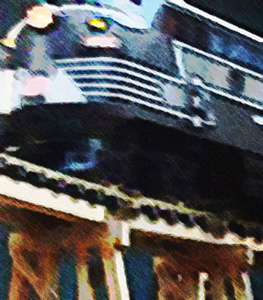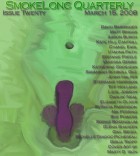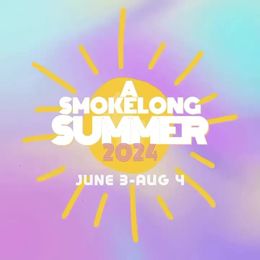My uncle Ezra used to take me into the woods to fish for trout. We made arrangements during the week when Ezra came over to eat. He drank a beer with dinner. My parents didn’t drink anything, ever, even if we were at one of the occasional parties at the house of my father’s partners where the old lawyers would drink, a lot. On Saturday Ezra arrived and parked in the driveway, idling, until I could sense he was there. I didn’t hear him. He didn’t knock or honk or anything. I went out into the cool dawn. The air smelled like the lawn, and the greenbelt across the street. Ezra sat in the driver’s seat reading the paper and drinking coffee from the cap of his thermos. The steam rose in a column out the window. He didn’t say anything. I climbed into the car and clicked fast the heavy buckle. The truck smelled of metal and oil and the ripped seats that lost hunks of yellow foam.
We drove for an hour at ten miles over the speed limit toward the mountains. At first we passed along huge cement walls built to keep the freeway noise out of the developments. Ivy grew on the wall, and in some places graffiti had been covered with grey or white blocks of paint. Then we passed through the countryside full of cow fields. I couldn’t tell what they used the field for. Finally we parked on a gravel road. The City of Seattle had posted signs: No Trespass. On one side of the sign it was woods, and on the other side of the sign it was woods. But because they had posted these signs, I imagined that it was better woods on the other side of the signs than it was on my side. There must be something interesting on their side. It seemed likely that if they went to the trouble of posting signs they would have some way of making sure people didn’t just scoff at the signs. I looked into the forest. It was just ferns and fir trees and a bed of moss.
“It’s the watershed,” my uncle said. “We can keep going. The signs keep everyone out, so there is no one to stop us.”
“We will contaminate the water supply,” I said.
“You think the deer read the signs?” he said.
“Deer are natural,” I said.
“Shit,” Ezra said. As an uncle, he could swear around me. My mom would give it to him if he said what he said when she was around, but he still said it. So, she gave it to him sometimes. “Bear shit is natural, but that doesn’t mean you should drink it.”
He kept walking down the track. There was no one out there, just the trees moving in the wind that blew down from the snow filled valleys in the mountains. I watched my uncle walk. I waited for him to turn around or something but he kept moving and then he was gone. He was my uncle. He could leave me in the forest to die. He didn’t have to look after me. My mom was his sister. He’d been losing and breaking her stuff since the day she was born.
I found the forest remarkably spooky. Unlike the trees in the greenbelt near my house, filled with dirt bike trails, spots where losers had dumped their trash, ant hills, power lines, the gravel road along the pipeline where the middle schoolers gathered to drink wine coolers and smoke, this place was empty. There were cattails with their fuzzy tips, tiny lily pads floating on the black and silver ditch water, and the tracks rubbed to a bright line by the passage of the lumber trains. The rest of the tracks were rusted brown.
The trees had been growing for decades before I was born. They would be growing decades after I was dead. In the greenbelt, they were surrounded by the cul-de-sacs, edged by preschools, kindergarten, and middle schools. There were office parks and bowling alleys and retirement communities and a vast cemetery on the hill over the lake where Bruce Lee was buried. In just thinking about the landscape where I lived, I understood what would happen to me and my remains. The trees in the watershed moved in a gust of ice chilled air. I ran down the tracks careful to keep my feet landing on each tie so I wouldn’t trip and face plant on the gravel or the rail. I tried to stop thinking about Bruce Lee’s headstone littered with the junk people left for him. No one ever gave the dead anything expensive, at least not since the Egyptians and the invention of plastic.
I followed my uncle for miles. I expected the watershed police to step out of the forest and handcuff us or to come riding on reindeer and wearing bright orange Gortex raincoats. I wanted to get off the tracks where it seemed likely we would be caught. The rail went over a trestle and my uncle stepped in the bushes and disappeared. When I tried to follow him, I found it was just mud and roots and was like climbing a ladder right down into the earth. At the bottom after we stepped through the salmon berries and devil’s club we stood on the gravel banks of a huge pond. The trestle crossed over one end. At the base of the pilings, old logs, sticks, and bark had accumulated into a dam. At the other end of the pond, the stream ran through the wood jumping through cataracts and tumbling down a waterfall. The black stone was slick near the waterfall and then coated in a thick carpet of moss. No one would find us here. We fished until we had our trout and then my uncle took out beers and we drank the cans sitting in the dim light of the culvert.
Maybe it was the illicit beer, but I loved coming to this secret place that was both beautiful and completely forgotten by the people who had built the massive trestle. One time a sound came from the distance, a kind of screeching rumble like an avalanche flying over the trees, and then an engine pulling a row of cars loaded with raw tree rounds, the branches freshly sheared off, the bark lacerated from the clear cut, passed over the trestle. In the canyon with its stone sides and already the nearly deafening roar of the rapids that fed the pool the air itself began to shake and rumble. When the train passed the sound remained in my ears and it wasn’t until we were in the car and driving back out down the gravel road that my ears popped and I could hear again.
I didn’t even know where this place was that my uncle took me. My uncle got cancer and maybe even already had it when he was taking me there. While he was sick no one in the family wanted to know about it. They didn’t say anything about him until he died and then they all pretended they missed him but if they weren’t visiting him while he was sick, how much could they miss him? It wasn’t like they could catch it or anything. I feel bad I never went to see him, but removed from the context of our fishing trip I never had anything to say to him and when I thought about seeing him I thought better of the awkward silence that would surely greet us after I saw him. Death is something that the dying have to deal with and the only way they comes to terms with it, is to die. The living don’t know what it is; if they did, they’d be dead.



 A SmokeLong Summer 24!
A SmokeLong Summer 24!